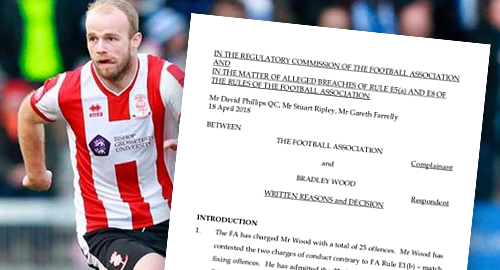 A UK football player has been banned from the sport for six years following evidence linking him to efforts to manipulate a novelty betting market with UK bookmakers.
A UK football player has been banned from the sport for six years following evidence linking him to efforts to manipulate a novelty betting market with UK bookmakers.
On Monday, the UK Gambling Commission (UKGC) revealed that information reported by one of its betting licensees had led the Football Association (FA) to issue a six-year ban against former Lincoln City FC defender Bradley Wood. The ban stemmed from 25 breaches of the FA’s Integrity and Betting Rules involving Lincoln City’s matches against Burnley and Ipswich Town FC during the 2017 FA Cup.
According to the formal investigation report, in both matches, Wood (pictured) was issued yellow cards for deliberate fouls very late in the proceedings (in the 90th minute of the Ipswitch match). The FA determined that Wood intentionally sought to be cautioned in order to influence betting markets on whether or not he’d receive a yellow card.
The UKGC forwarded the information it received from its licensee to the FA. The bettors apparently failed to grasp the concept of discretion, as of the seven individuals who placed wagers on Wood being cautioned in the two matches, none of them had previously wagered on any caution betting markets. In fact, four of the bettors were using their accounts for the very first time.
Moreover, all of the bettors were placing larger bets on Wood being carded than anything they’d bet previously, and five of these seven wagers were the maximum stake allowed by the operator for that type of market. Bookmaker William Hill claimed to have never previously taken a four-figure wager on the ‘to be carded’ market.
It turns out that two of the bettors were Wood’s close friends, while some of the other bettors were friends of these friends. An analysis of text messages between Wood and some of these bettors showed an unusual flurry of activity ahead of each match, although the content of these messages wasn’t disclosed (deliberately withheld from investigators, in the FA’s view).
The FA further notes that Wood’s financial situation was in “a parlous state” at the time of the incidents, which they claim is further motive for involvement in a betting scam.
Wood’s defense cited the foul in the 90th minute of the Ipswitch match, suggesting that if he was truly trying to game the system he wouldn’t have left it so late. His defense also took exception to the description of his financial situation as ‘parlous,’ saying that while he “may not be particularly affluent” he was holding his own.
All told, the FA believed the preponderance of circumstantial evidence put the burden of proof onto Wood, who declined to show up to testify at his hearing. The FA believes Wood was a no-show because “there is no live evidence from him to contradict the FA’s case.”
In the end, Wood was found guilty, and in addition to his playing ban he was fined £3,725 and ordered to pay costs of £1,550.
Novelty betting markets in which a player has a direct ability to influence the outcome are having a particularly bad month. UK-licensed Sun Bets was just fined by the UKGC for the operator’s role in 2017’s infamous PieGate incident, and the offering of a market “which carried a risk of inciting an individual to breach a sports governing body’s rules.”





